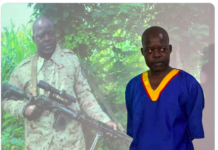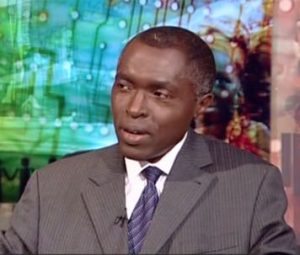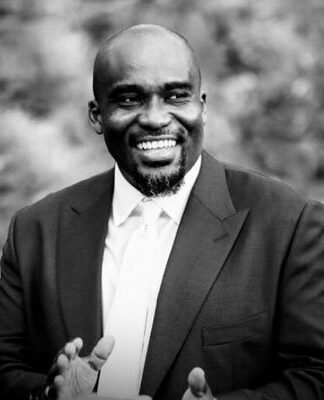The theme that started the discussion wasn’t about identity and politics, but at the end, it came to be.
Initial exchanged views wondered why Rwanda was not officially represented in Washington at a ceremony awarding Donald Kaberuka a prize for his performance at the African Development Bank.
Beyond the absence of the official Rwanda at that ceremony, many sustained arguments questioned who was Rwandan or who was not. Could for example having ancestral roots or some remote relatives in the country entitles someone to being called Rwandan when they were born and raised or grew up outside?
The issue of double nationality emerges here. However the topic took a tangent direction and looked into who could legally participate fully in Rwandan politics, despite their origins.
Donald Kaberuka being the starting point of the discussion, and because of his professional credentials, his “Rwandaness” was almost thoroughly scrutinised as a potential candidate to replace president Kagame.
His personal integrity as an individual whose fairness could be seriously challenged in difficult circumstances was somehow examined by some participants.
The question of nationality or the much narrowly defined one of citizenship and its corresponding responsibilities and entitlements became somehow the core of the whole conversation.
Looking back, I don’t remember at any other time of Rwandan recent history when who was who, because of their origins [to understand here some reference to being or being seen as foreign], was so central and critical to the political life of the country.
Not far from home, we recall the case of that “Congolese” Tutsi Barthélémy Bisengimana Rwema who was the head of the Bureau of the President under Mobutu Sese Seko of Zaire from May 1969 to February 1977, and the influence he could have – in fact he did use it cleverly for his community, particularly in the Kivu provinces – in Congolese affairs by being so close to where the country was run.
Much more recently, – but not so much so for the Rwandan younger generation -, we have the numerous Tutsi military who occupied significant and important positions both in Uganda before 1990 and the Democratic Republic of Congo after 1997.
James Kabarebe became the military chief of the first government of the late assassinated Congolese president Laurent-Desire Kabila after the defeat of Mobutu by AFDL. Today the same Kabarebe is the Rwandan Minister of Defense. Serving under different national flags like mercenaries do, depending on where allegiance and other interests lie.
Isn’t this a strategic astuce for president Kagame and those who feel that he represents their interests to be simultaneously home anywhere and nowhere? In other words, that they can feel home in any part of the world they can conquer.
And it is not the intentions that are lacking, looking at what has been pursued and achieved and is still not so far from completion in the Great Lakes region. I am not venturing here in the endless possibilities of such strategy either politically or economically.
With the arrival of RPF in Rwanda politics, we have seen some of its members apparently with several nationalities. Many could traffic them easily. One day they can be Ugandan, Belgian, American, Canadian, Tanzanian, Burundian, then the other become Rwandan and or Congolese, or something else depending on circumstances or interests at play momentarily.
The mercenary character
Since 1990, Rwanda as a country has gone through so much in terms of sufferings (millions of lost lives and never-ending oppression of masses inside and outside national boundaries).
Though today we know that most of the losses were directly caused by Rwandans themselves against their owns, the participation of foreign mercenaries cannot be denied.
Some years back I remember talking to a Somali guy on a London street who told me his military adventure in the Democratic Republic of Congo when he was fighting under the command of Rwandan generals towards the end of the 90s.
During the battle of Kigali in 1994 for example, it is reported that military casualties of Ugandan origins were found among the victims of the fighting between Habyarimana forces and RPF. This was probably one of the consequences of some members of the latter rebel group having helped Ugandans in what president Museveni called “liberation.”
For Rwanda, some call “liberation” the period starting from 1990 with the invasion of the country by RPF, but for others it is instead viewed as the coming of alienation and oppression of levels never experienced before in the country.
For the latter group, trying to understand the ongoing context that Rwanda found itself into falls sometime into searching explanation of what has been happening into a possible foreign character among the Rwandan ruling class of today.
Those supportive of such view argue that the repressive nature of RPF towards Rwandans could only find its perhaps understanding in the fact that many in its ranks have very loose connections with Rwanda.
And this would probably explain for example the behaviour of the Rwandan president’s killing squads with their mercenary-like attitudes of invaders operating in a conquered territory. As one interlocutor in the mentioned discussion puts it:
“…we are stuck with people who can’t talk to other Rwandans (Hutu, Tutsi and Twa outside the inner circle of RPF’s regime), who don’t care about Rwandan lives, they only know one thing, kill to survive. You want to know why? Because they were nothing, …and they can’t afford to go back to nothing.”
The infamous Gacaca judiciary system which saw the majority hutu (between 1.5 and 2 million adults) pushed into a category of second class category citizens, dispossessed and deprived of all privilege a normal citizen has access to, without any economic future, plus a range of apartheid style policies excluding them, find their ideological roots into the mentioned mercenary-like attitudes.
Romans in their time and their other fellow westerners during the slavery and colonial periods behaved sometimes more kindly towards their subjects in conquered territories than RPF has been doing towards Rwandans.
One cannot dismiss easily Kagame’s regime mercenary character when they see it dealing with its own citizens the way it does. Resident administrators conduct themselves surely differently when they are in a conquered land and or particularly when they have some historical and ethnic affinities with locals.
Lack of bond with true Rwandans
Since the overtaking of power in Rwanda by RPF, the official speech particularly from president Kagame, close analysis of his reference to Rwandans means something else but the masses (Hutu, Tutsi and Twa indiscriminatory) that constitute the ordinary citizens.
It is not without deep seated feeling about his special origins or that he does not have anything to do with those that he refers to, that president Kagame utters publicly that he regrets not having been able to massacre those (Rwandans) who, in 1994 for example, managed to flee his advancing rebels and ended up in neighboring countries.
Or when the Rwandan president announces publicly that those his regime would find having connections with opposition parties would be killed in daylight. These are public statements he usually make in Kinyarwanda as if he didn’t want foreigners to know how he terrorises his citizens.
Past sophisticated and rich civilizations or widely reaching political systems have fallen into obsolescence for different reasons. Embedded inefficiencies and or incompatibility with subjects’ aspirations were among them.
Though its sophistication or richness as a system of repression and domination might be discutable the same way criminal organisations could be, RPF as a political structure will have to radical change and almost start afresh on a “tabula rasa” in order to survive.
Last but not least
With time, people lose connection with their roots. This has been happening to Rwandans too, whatever their ethnic origins or time of their recent or past history.
It is not that they become less Rwandan, but they lose at some extent that sensitive bond between people belonging to a similar cohesive community which makes them seek genuinely the good of all its members without any hidden selfish agendas of some of them.
They can remain sensible to what happens to people and places they left behind long time ago or haven’t known because they were born and grew up far away from them.
If circumstances take them back, they won’t feel attached to the land and people they find there as much as someone who never left. And most of the time, their attitude will be detrimental to the wellbeing of the latter.
At the end of the day, it is not so much the nationality we carry with us individually, trafficked or not, which counts most in national politics, but political intentions of dominant interests of places we live in that prevail. And how strongly connected to the people will generally determine how sensitive those interests will be to their real needs.
Accepting to be behind them remains always a personal choice. We can decide or not to support for example NATO bombing Libya, a president seeking a third unconstitutional term in office, or RPF of Kagame invading DRC or killing and imprisoning Rwandans.
Identity and politics get its true sense when it is viewed in connection with the bond that circumstances or history build for and between the people involved.
Ambrose Nzeyimana
Political Analyst/ Activist
Organising for Africa, Coordinator
The Rising Continent, Blog editor
London, UK
Email: [email protected]





























































